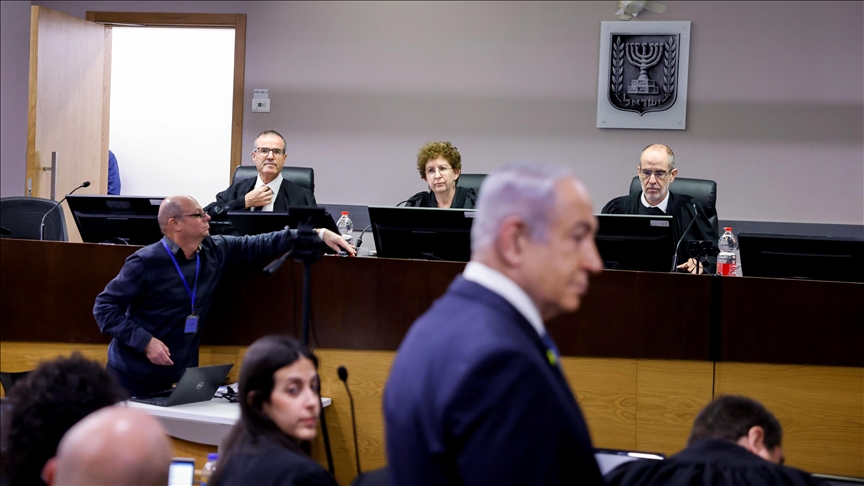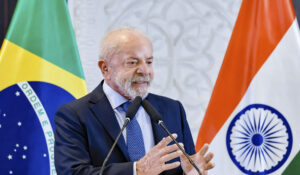
Published 02/04/2025 11:37 | Edited 02/04/2025 12:10
Israeli Prime Minister Benjamin Netanyahu provides his 21st testimony to justice in the process known as case 4000, in which he is accused of bribery, fraud and breach of confidence. The trial, which has been pending since 2020, occurs as the Israeli leader faces reports of war crimes, mass protests and the deepening of investigations involving nearby allies.
According to the prosecution, he granted regulatory advantages to the telecommunications company Bezeq, controller of the Walla! News Portal, in exchange for coverage favorable to his image and his wife, Sara Netanyahu. The prosecution estimates that favors have added the equivalent of $ 500 million. During the statement, Netanyahu again denied that he used his position to favor business interests in exchange for political benefits.
Case 4000 is considered the most serious among the three criminal proceedings involving the premie. In case 1000, he is accused of receiving luxury gifts, such as champagne and cigars, from entrepreneurs such as Arnon Milchan and James Packer, in exchange for political favoritism.
In the case 2000, he would have negotiated favorable coverage with the owner of the Yedioth Ahronoth newspaper, offering the support of a law that would weaken his main competitor in contrast.
Although Israeli legislation does not oblige a renunciation of a premie during a lawsuit, scandals have been aggravating an institutional and political crisis that has been extended for years. The trial has been suspended a few times due to the pandemic and, more recently, by the war began after Hamas attacks on October 7, 2023.
Close allies arrested for illegal action in favor of Qatar
Two days before the testimony, the crisis worsened with the advancement of the scandal known as Qatargate, who led to the arrest of two close to Netanyahu advisers: Yonatan Urich and Eli Feldstein. Both are investigated for allegedly acting on behalf of the Government of Qatar to influence the coverage of the Israeli press, minimizing the role of Egypt in negotiations for a ceasefire with Hamas.
According to Israeli court documents, the two would have received bribes and coordinate public relations campaigns in national vehicles, promoting a positive image of the Arab Emirate. The complaint also involves the attempt of interference in Israeli foreign policy and public perception of the efforts of mediation between Tel Aviv and Gaza.
Netanyahu also testified in the case this Monday (31), but denies any involvement. In a video released on his Telegram channel, he classified the investigation as a “political hunt.” The defense maintains that the inquiry aims to prevent the premiere from relying on the resignation of the head of the Internal Intelligence Service (Shin Bet), Ronen Bar, who conducts the investigation.
The possible obstruction of the investigation by the government summit generated reactions inside and outside Israel. In a press release, the hostage families forum stated that scandals reinforce the suspicion that Netanyahu is prolonging the war to remain in power and avoid arrest.
Attempted Shin Bet’s boss exposes the state’s equipment
The attempted resignation of Shin Bet Chief Ronen Bar was suspended by the Supreme Court of Israel, who marked the analysis of the legality of the measure to April 8. Bar had held the Netanyahu government responsible for the failure that allowed Hamas attacks in October and later began to lead the investigation into Qatargate.
In the midst of the dispute, Netanyahu announced the appointment of the vice-feather-alminarante Eli Sharvit as the new head of the service. However, he turned back after external pressures, especially from Republican Senator Lindsey Graham, ally of Donald Trump. Graham claimed that Sharvit statements against Trump’s energy policy would generate tensions with Washington.
The attempted equipment of the intelligence service, coupled with foreign interference in the appointment of its bosses, aggravated the institutional instability in the country. According to the Israeli press, the government also consisted of removing Attorney General Gali Baharav-Miara, who operates in investigations against the prime minister.
Analysts evaluate that interference with control and safety bodies represents Netanyahu’s attempt to shield against scandals and neutralize independent investigations in a movement that has generated protests inside and outside the country.
UN accuses Israel of executing Palestinian rescuers in Rafah
At the military level, the resumption of attacks on Gaza after the end of the truce on March 18 resulted in the murder of 15 humanitarian workers, including a UN employee in the city of Rafah, southern Gaza Strip. The complaint came from the United Nations itself, which accused the Israeli army of executing the victims one by one and buried their bodies in a common grave, next to destroyed ambulances.
According to Crescent Palestinian red, the teams were on a rescue mission and had requested safe ticket. The UN stated that the vehicles were clearly identified. The Israeli army, in turn, claims that the targets “advanced suspiciously” and that among the dead would be militants of Hamas – without evidence.
The death of rescuers occurs in a context in which more than 50,000 Palestinians have been killed since the beginning of the war, according to Gaza officials. The UN has 1,060 health professionals murdered since October.
The episode raised international pressure on Israel and can strengthen the International Criminal Court, which has already issued arrest warrants against Netanyahu and former Defense Minister Yoav Gallant for war crimes.
Protests grow within Israel by agreement and end of war
The internal crisis also intensifies. More than 100,000 people took to the streets of Israel last Saturday (29), demanding the liberation of hostages in Gaza, the end of the war and the interruption of judicial reforms proposed by the government. The movement was led by relatives of hostages and former military personnel, with the support of various sectors of society.
According to channel survey Channel 12, 69% of the population supports a ceasefire in exchange for hostage release, including 54% of coalition voters. The demonstrations also criticized Netanyahu’s attempts to dismiss key authorities and to prolong the conflict to protect his political interests.
Since Hamas captured 251 hostages on October 7, 59 have been detained – and at least 35 are dead, according to the Israeli government. The pressure for an agreement grows as negotiations fail and the popularity of the premier plummets.
The sum of judicial scandals, humanitarian violations and political repression points to a deep crisis government – internationally isolated, contested on the streets and contested in the courts.
Source: vermelho.org.br

